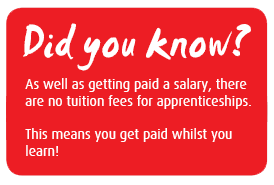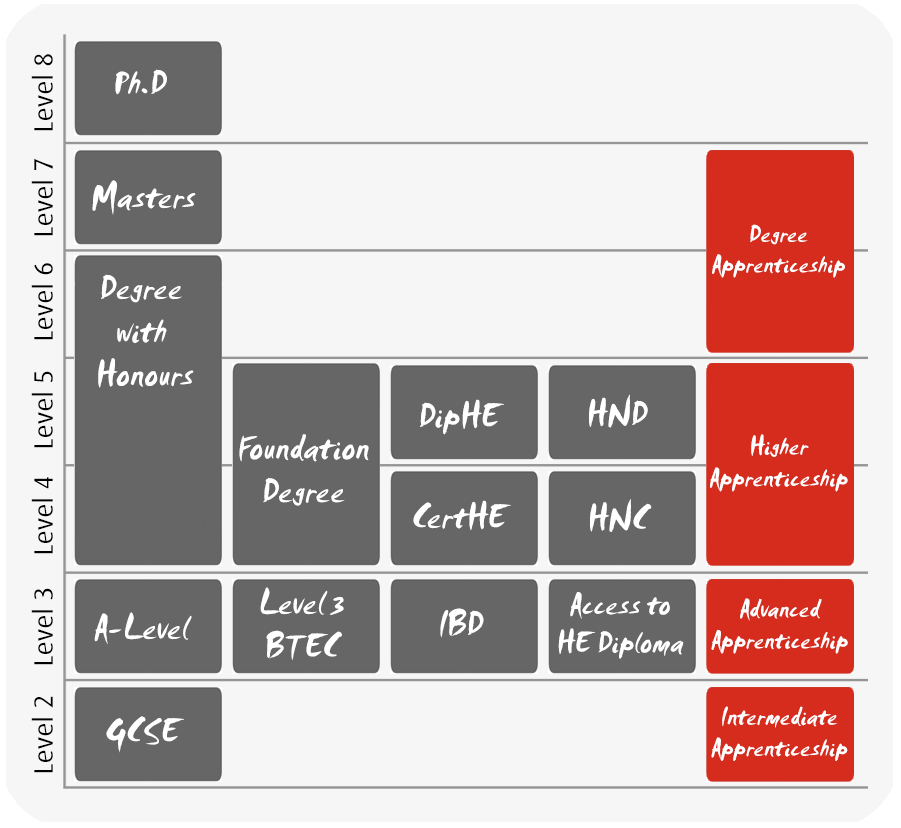What are: Apprenticeships?
Apprenticeships give you the opportunity to gain a qualification whilst you earn a salary. Apprentices spend most of their time in the workplace learning on the job, and some time (usually one day a week) learning theory in the classroom – sometimes in a school, further-education college or university.
Because apprenticeships are designed to prepare you for specific careers there are loads of different types, so when researching apprenticeships it is worth looking at the level of qualification they will give you and what the balance between work and theory is.
When do I take them?
Apprenticeships usually fall into one of four levels: intermediate, advanced, higher and degree. When you take an apprenticeship depends which level you’ll be studying at. Generally you can take any apprenticeship whenever you want after you are 16. However for some of the higher level apprenticeships (the advanced, higher and degree) you’ll either need to show that you have experience working in the area you will be studying in, or have completed some other qualifications. Degree apprenticeships especially will usually ask that you have completed BTEC or A-level study or an advanced apprenticeship before you begin.
How long do they take?
Apprenticeships will take you at least a year, but often they take longer than this, especially if you are studying higher-level qualifications. Degree apprenticeships for instance often take between four and six years.
Who are they for?
Apprenticeships allow you to learn all of the skills you’d need to go on to a career in the area you are learning in, so will suit people who want to get into a particular industry or job. They are great for learners who are very hands and enjoy learning by example. Apprenticeships do not usually involve exams as apprentices demonstrate their knowledge by doing.
 Where will they take me?
Where will they take me?
The great thing about apprenticeships is that you will learn in the workplace. This means that when you have finished you are in a strong position to get a job similar to the one you have been doing whilst you studied. Over half of apprentices carry on working for the the company where they worked whilst studying; this is because t your employer will know that you have learned all the skills you need to work effectively.
Where do I study them?
Your time as an apprentice will be split between working in a further education college or university and the workplace. This means that you will actually be doing the job you are learning about as you study.
How much do they cost?
One of the best things about apprenticeships is that there are no tuition fees, and you actually get paid to take them. This is because you work whilst you learn. You will earn at least the national minimum wage for apprentices, though some companies pay you more, especially for higher-level apprenticeships. You’ll often be earning less than if you had a full time job, so some careful budgeting is required to make sure that you can live off the payment you’ll receive, remember, you’ll need somewhere to live, to eat and enjoy yourself whilst you study!
Apprenticeships on the qualifications grid
The qualifications grid shows some of the most common qualifications in the UK, and their levels. There are 8 levels of study in the UK, remember these don't relate to how long qualifications take, but they are used to show how qualifications compare with each other. Use the grid to find out what level apprenticeships can be in comparison with other qualifications.

Where can I find out more?
You apply directly to the company or business where you’ll be studying for your apprenticeship. However there are are lots of services that list apprenticeships, the most extensive is the find an apprenticeship service. Try notgoingtouni for apprenticeships listings that you can filter by business, start date and location. There is also lots of useful advice available on and GetinGoFar and the apprenticeships guide.




